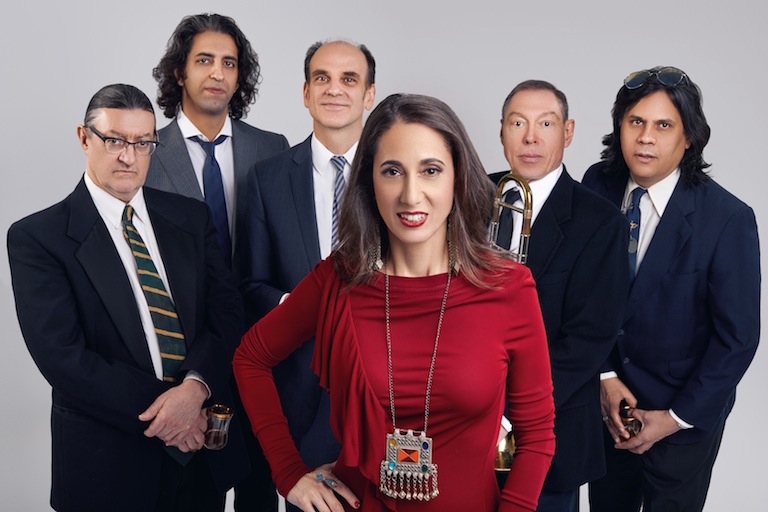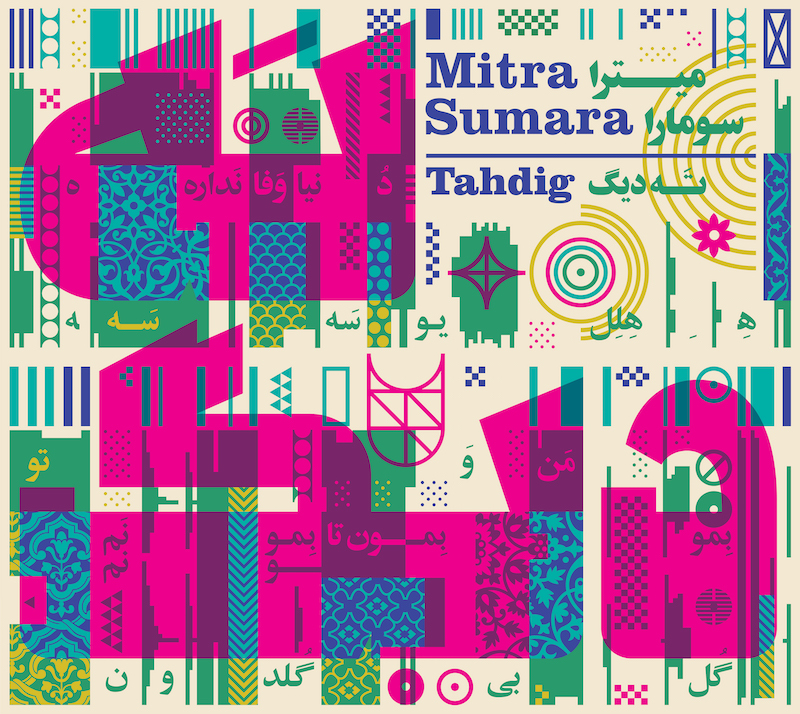Taking chances for change

Before we delve into "Tahdig", the debut album by Mitra Sumara – which translates from Farsi into English as ʹthe light of our friendshipʹ – we need to define what the musicians mean when they call themselves New York City's finest Farsi Funk band. While the New York City bit is self-explanatory, the whole Farsi Funk thing could do with some attention.
The popular music of Iran in the 1960s and 70s, before the revolution, combined elements of disco, funk and Latin music with Middle Eastern melodies and poetic lyrics. As a band Mitra Sumara are interpreting music that was made popular during those days by beloved Iranian singers, Googoosh, Soli, Leila Forouhar, while also re-working southern Iranian Bandari beat tunes.
However, this isn't the same funk James Brown made famous. Sure there are horns, bass and drums, but the music isn't as loud and brassy as that which most of us usually associate with the genre. There's a definite jazz influence that has helped to smooth some of the rough edges. That doesn't mean the music is any less good or interesting than other forms of funk, it just means it might take your ears a little while to get accustomed to what they are hearing.
More than a search for personal identity
Founder and lead singer Yvette Saatchi Perez discovered the music of 1970s Iran by a roundabout route. Aware that she was half-Iranian, it was only when she began searching for her natural father that she encountered the music of the country where he was born. Having established contact, she was moved to teach herself Farsi and founded Mitra Sumara. However, the band is not just an offshoot of a person's search for personal identity, but a love letter to the beauty of Iranian culture and music.

Perez and her fellow musicians; Peter Zummo (trombone), Bill Ruyle (hammered dulcimer), Julian Maile (guitar), Jim Duffy (keyboards), Nikhil Yerawadekar (bass), Michael Evans (drums/congas) and Kaveh Haghtalab (drums/percussion) all bring a wealth of experience to this new venture. Between them this group of musicians has worked in everything from jazz to rock and new music.
Aside from the novelty of the music's origins, since most of the source material for the album will be unfamiliar to most non-Iranians, what's truly fascinating about the group is their ability to play so many different styles of music, while keeping them accessible to a wide variety of listeners without compromising on quality. It's requires a great deal of skill to walk the fine line of creating something that will appeal to a large number of people and not sound like you've sacrificed anything along the way.
A musical education
Right from the opening song, "Bemoon ta Bemoonam", it's obvious this band isn't afraid to take chances and make their music as interesting for themselves as it is for their listeners. The opening of horn and percussion quickly gives way to a tinkling electric piano and a choppy guitar sound, both of which feel as if they could have been lifted from almost any movie or T.V. show of the 1970s.
However, before we can make any assumptions on the way the song is going to develop, the horn and percussion return as an introduction to Perez's vocals. Singing in Farsi – hence Farsi Funk – her voice rises and falls like a bird in flight. But that doesn't mean she sings in a delicate whisper. Instead, she makes a forceful, one could almost say abrupt entrance and then, propelled by the music's spiralling ascents and descents, her singing guides the listener through the piece.
Of course not being able to understand Farsi prevents me from actually understanding what she's saying, or even what the song is about. However, as in classical opera where the sung line becomes another musical instrument, the lyrics are in some ways secondary to the experience of simply listening to the sound of her voice and how it works with the rest of the band.Punch, dimension, texture
Listening to Perez is a bit like hearing one of the great jazz scat singers; singers who eschew using comprehensible lyrics and instead improvise sounds to accompany the band. While, however, she is obviously singing lyrics, in songs like "Helelyos" she adds various inarticulate exclamations as punctuation to the music during the course of the tune. Not only do they sound great, they also give the music extra punch and dimension.
Of course alongside those elements we would normally associate with music from Europe and North America, there are the musical contributions from Iran. Sometimes there are subtle reminders in a song that this isn't your typical funk/jazz recording. Hammered dulcimer is not an instrument you expect to hear being played in this genre. Yet there it is popping up to lend the music a different texture. While it may not sound like a big difference, hearing its distinctive sound in this context changes the music significantly and adds to the uniqueness of the band's sound.
"Miravi", the fourth song on the disc, is probably the track that is most obvious in its Iranian origins. The flow of the music, the dulcimer taking the lead and the piece's ornate simplicity create a feel that is worlds apart from what we've heard up until now. While each track on the album is very different, this one stands out for its simple beauty. What's especially impressive about this is there aren't many bands that can both tear through music and play something like this tune with equal proficiency.
In a statement about the album Perez calls what her band does "the chance to present positive aspects of Iranian culture to the West". While a band can't do much to influence government policy, they can do a lot to educate people. While the American government might be making attempts to vilify the Iran as a country, Mitra Sumara are doing their best to enlighten people about their country's unique music heritage.
"Tahdig" by Mitra Sumara is a wonderful collection of music which will delight listeners of all backgrounds and interests. All of which makes it the perfect vehicle for helping to build bridges between two countries and cultures that have been alienated for such a long time.
Richard Marcus
© Qantara.de 2018
